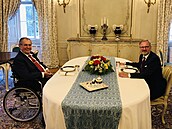His words also helped shape modern Britain and France and yet few people know much about him at all. "Possibly the most influential writer in modern human history" - that's the billing Thomas Paine got from one of his biographers. There are statues of him in Paris and New Jersey and a monument to him in New York - though we still haven't reached a situation where, as the nineteenth-century French leader Napoleon said, "a statue of gold should be erected to him in every city in the universe". Yet no high-level commemorations of his death have been planned. And ask people in the average British street who he is, and they are likely to reply "Er...".
Born in Thetford, Norfolk, in 1737, Paine's early adult life as a corset-maker and teacher was unmarked by politics. But it was his subsequent job as an excise officer that inspired him to pen his first political work - a 21-page pamphlet that demanded better pay and conditions for his fellow workers. A chance meeting with Benjamin Franklin, one of the founding fathers of the US, in London in 1774 changed Paine's life - and, in time, American history. Following Franklin's advice to cross the Atlantic, Paine pitched up in America in November 1774, just as American revolutionaries were having heated debates about whether to break with Britain.
In January 1776 he published a short pamphlet that earned him the title "The Father of the American Revolution". Titled simply, Common Sense, it put the case for democracy, against the monarchy, and for American independence from British rule. Thomas Jefferson's Declaration of Independence followed soon after.
Cited by Obama
Paine went on to write a series of pro-revolutionary pamphlets, which were later published together as The American Crisis. They were designed to lift the spirits of America's supporters of independence in difficult times, and 200 years later were invoked by Barack Obama in his inaugural speech with a similar aim in mind. Though this time the difficulty lay in economic recession rather than a revolutionary war.
Paine worked in various positions in America's early government, but was never accepted as one of the founding fathers, also because of his engagements in France. But while Paine was elected to France's first democratic parliament and Napoleon Bonaparte numbered among his fans, his next pamphlet, The Age of Reason, was a step too far. An attack on organised religion and a defence of "free and rational inquiry", the work saw him subtly edged out of founding father status in the US. When he died on 8 June 1809 in New York, there were only six mourners at his funeral. Today, his legacy is enjoying a rehabilitation. BBC













